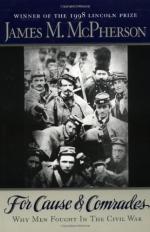
|
| Name: _________________________ | Period: ___________________ |
This quiz consists of 5 multiple choice and 5 short answer questions through Chapter 4, If I Flinched, I Was Ruined.
Multiple Choice Questions
1. In the discussion of the battle energy, an anemic Yale graduate--who later died at 26--recounted that the double-quick was not a fast enough pace; what disease did the man have?
(a) Typhoid.
(b) Scarlet fever.
(c) Tuberculosis.
(d) Bright's disease.
2. In the discussion of the officers' views on training, which of the following did a captain in the 85th New York NOT believe would get men to fight well?
(a) Food.
(b) Leadership.
(c) Discipline.
(d) Drill.
3. As the book opens, McPherson says that he took some Princeton students to Gettysburg in the spring of what year?
(a) 1984.
(b) 1976.
(c) 1993.
(d) 1962.
4. When discussing various war memoirs, McPherson mentions that James Gooding, a black soldier in the 54th Massachusetts, wrote which of the following?
(a) On The Altar of Freedom.
(b) Hard Marching Every Day.
(c) The Rebel Yell and the Yankee Hurrah.
(d) Hard Tack and Coffee.
5. In May 1864 the 7th New York was delighted to be ordered into action; they were less excited nine months later after having lost how many men?
(a) 147.
(b) 291.
(c) 309.
(d) 98.
Short Answer Questions
1. Having discussed how the eagerness for battle faded, McPherson goes on to say that soldiers turned to the most pervasive presence: ________?
2. As McPherson discusses the initial impulse that prompted men to enlist on both sides after the raid on Fort Sumter he references which of the following French terms?
3. When discussing Jesse Beecher's service record, McPherson states that he fought in all BUT WHICH of the following states?
4. As the excitement for battle raced across the country, the governor of Ohio said he could not send the requested thirteen regiments but would send how many?
5. As McPherson begins to describe the training regimen kept by soldiers, he quotes a young man from Indiana who wrote what relative, complaining a soldier "is not his own man"?
|
This section contains 304 words (approx. 2 pages at 300 words per page) |

|




